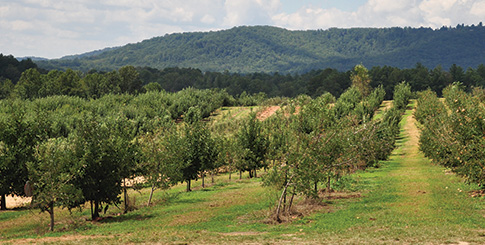North Carolina’s Market
Like its sibling state, North Carolina has many produce outlets that mix terminal and farmers’ markets where local growers can sell to both wholesalers and the general public.
Catching up with Charlotte
Amie Newsome, manager for the Charlotte Regional Farmers Market, says tenants at the site are holding their own. “This city’s economy is doing well,” she observes. “When the economy is good, our vendors get a lot of foot traffic.”
RANKING IN THE TOP
Optimal soil and weather conditions in North and South Carolina usually produce a bumper crop of fresh fruits and vegetables each year. Growers, wholesalers, retailers, and residents all benefit from the bounty.
North Carolina is ranked in the top ten nationally for a host of fruits and vegetables, including sweet potatoes (first); strawberries and pumpkins (fourth); bell peppers and watermelon (sixth); blueberries, cantaloupe, peaches, and tomatoes (seventh); apples and squash (eighth); and grapes (ninth), according to the U.S. Department of Agriculture.
South Carolina is the largest East Coast peach grower and second nationally; it is fifth in watermelon production; sixth in cantaloupe; eighth in tomatoes; and tenth in squash. The Palmetto State also produces broccoli and greens including collards, cilantro, kale, and parsley.
Visitors range from retailers and institutional buyers to consumers who want to “eat healthier by cooking more at home,” Newsome notes. Chefs procure items for menus from wholesalers as well as local farmers, who have their own market section. “This city has a vibrant restaurant scene,” she points out.
In addition to Charlotte’s diversity, the market’s site is advantageous too. “We’re fortunate to be on the city’s southwest side, near the airport and a major thoroughfare, and not too far from Interstate 77,” Newsome continues. “Geographically, it’s a good location.” Ongoing area construction of both apartments and townhomes has also helped bring more people to the market.
For Randy Bailey, president of Bailey Farms Inc. in Oxford, NC, the continual influx of residents is always good news, as the “population increase will only help as there will be more mouths to feed.”
Performance Produce, LLC is located in Salisbury, a little over 40 miles northeast of Charlotte, and grows yellow squash, zucchini, jalapeño peppers, watermelon, and onions. J.R. Roach, the vertically-integrated grower, packer, and shipper’s managing member, sells mostly to retailers who are catering to the area’s increasingly diverse residents. Performance Produce also offers storage services and load consolidation to its customers.
Rallying in Raleigh
Another Tar Heel State market, the North Carolina State Farmers Market in Raleigh, is experiencing robust sales as well, according to market manager Ronnie Best. It has a prime location, adjacent to downtown Raleigh, which helps attract consumers looking for fresh, local produce.



